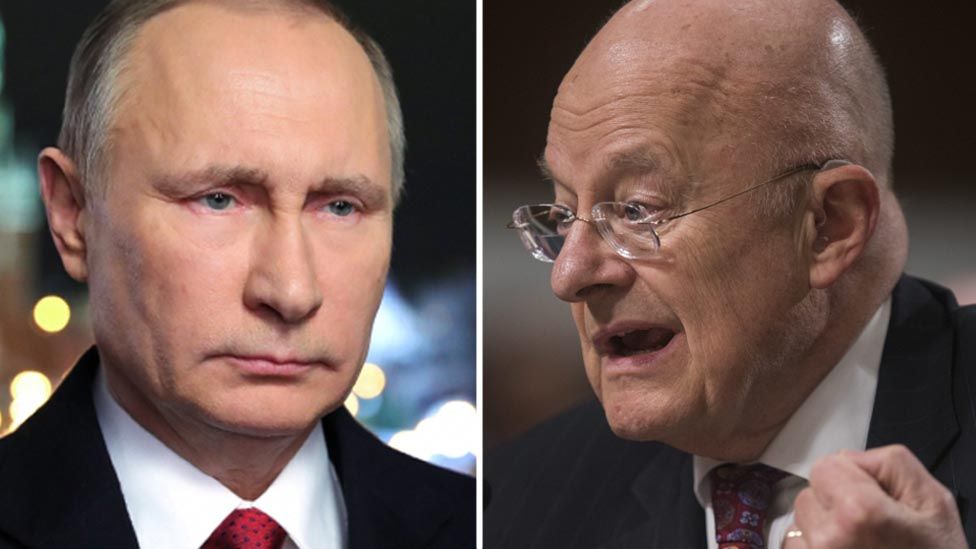Russian hacking claims: US spy chief promises Putin motive
- Published

The US intelligence chief has promised to explain why Russia allegedly meddled in the US presidential election.
Director of National Intelligence General James Clapper said Russian President Vladimir Putin ordered the hack of Democratic Party emails, and the motive will be revealed next week.
Russia has denied involvement but the US has announced sanctions against Russian officials.
President-elect Donald Trump is to be briefed on the hacking on Friday.
Intelligence chiefs will take him through a report, which was given to President Barack Obama on Thursday, on foreign meddling.
An unclassified version will be made public next week.
Top US intelligence officials gave testimony on Thursday to the Senate Armed Services Committee investigating the alleged interference.
In their assessment, Moscow interfered to help Mr Trump, the Republican candidate, beat Democrat Hillary Clinton.
Asked by a congressman if they "will ascribe a motivation to Putin", Mr Clapper replied "yes, we will ascribe motivation".
Mr Clapper described the Russian efforts as a "multifaceted campaign", which featured "classical propaganda, disinformation, [and] fake news".
In joint testimony prepared for the hearing, officials said Russia had an advanced cyber-programme that posed a major threat to a wide range of US interests.
"Russia is a full-scope cyber-actor that poses a major threat to US government, military, diplomatic, commercial and critical infrastructure," the testimony said.
It was written by Mr Clapper, Marcel Lettre, Undersecretary of Defense for intelligence, and Admiral Michael Rogers, director of the National Security Agency.
Senator McCain, in opening the session, reminded the panel that they were not there to "question the outcome of the presidential election".
"We cannot say they did not change any vote tallies or anything of that sort," Mr Clapper said about the Russian intelligence operation, adding that the Russians may have had "multiple motivations".
"We have no way of gauging the impact... that it had on the choices the electorate made."
Asked by Senator McCain about whether it was "an act of war" Mr Clapper said "that is a very heavy policy call that I don't think the intelligence community should make".
Mr Trump has repeatedly rejected allegations that the Russian government hacked into the computers of John Podesta, Hillary Clinton's campaign manager, and the servers of the Democratic National Committee.
On Thursday, he said he was a "big fan" of intelligence agencies, after months of casting doubt on the Russian link.
Last week he said he would announce information about hacking "on Tuesday or Wednesday", but no announcement came.
The Department of Homeland Security in late December released a declassified report to bolster accusations that the Russian government deliberately sought to aid the New York real estate mogul's candidacy.
The Obama administration also expelled 35 Russian diplomats from the US and closed two compounds said to be used by Russian intelligence.
But Senator Lindsey Graham told the Senate committee that President Obama had not gone far enough with his response.
"It is time not to throw pebbles but to throw rocks," he said.
Also on Thursday, the Trump team told US media the president-elect would pick former Indiana Senator Dan Coats for Mr Clapper's replacement as director of national intelligence.
- Published4 January 2017
- Published22 December 2016
- Published27 October 2016